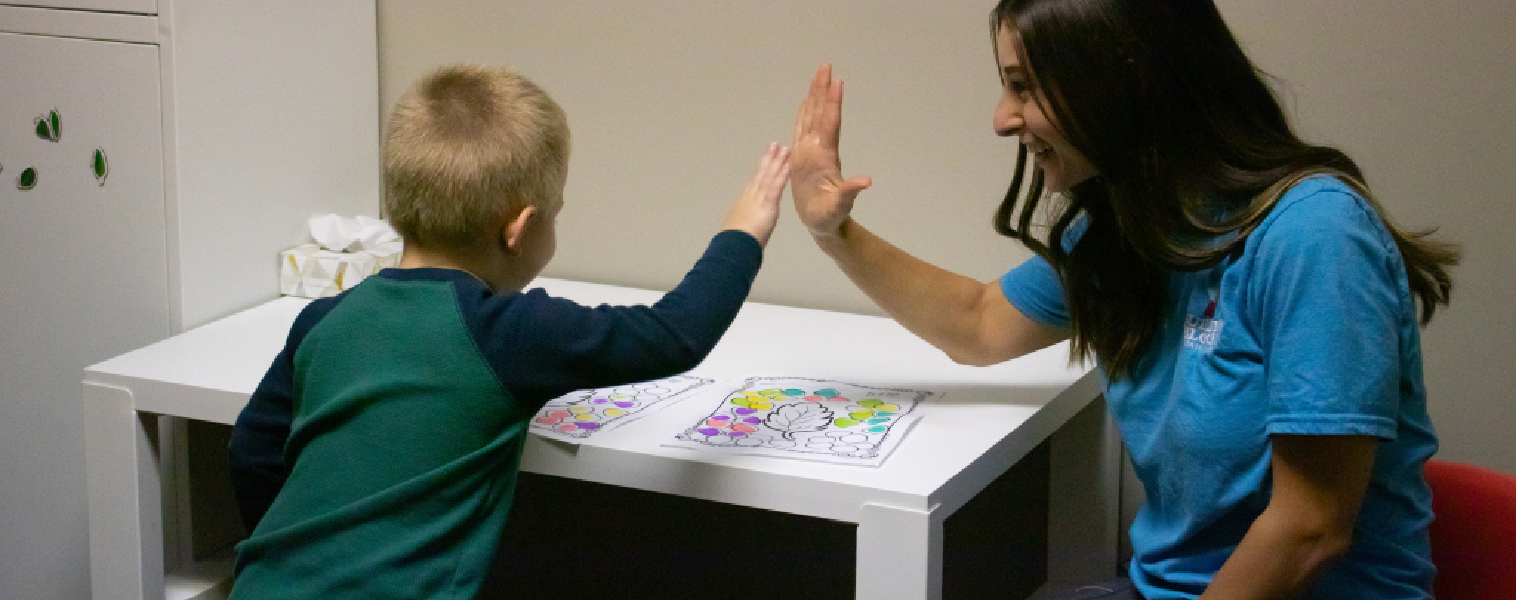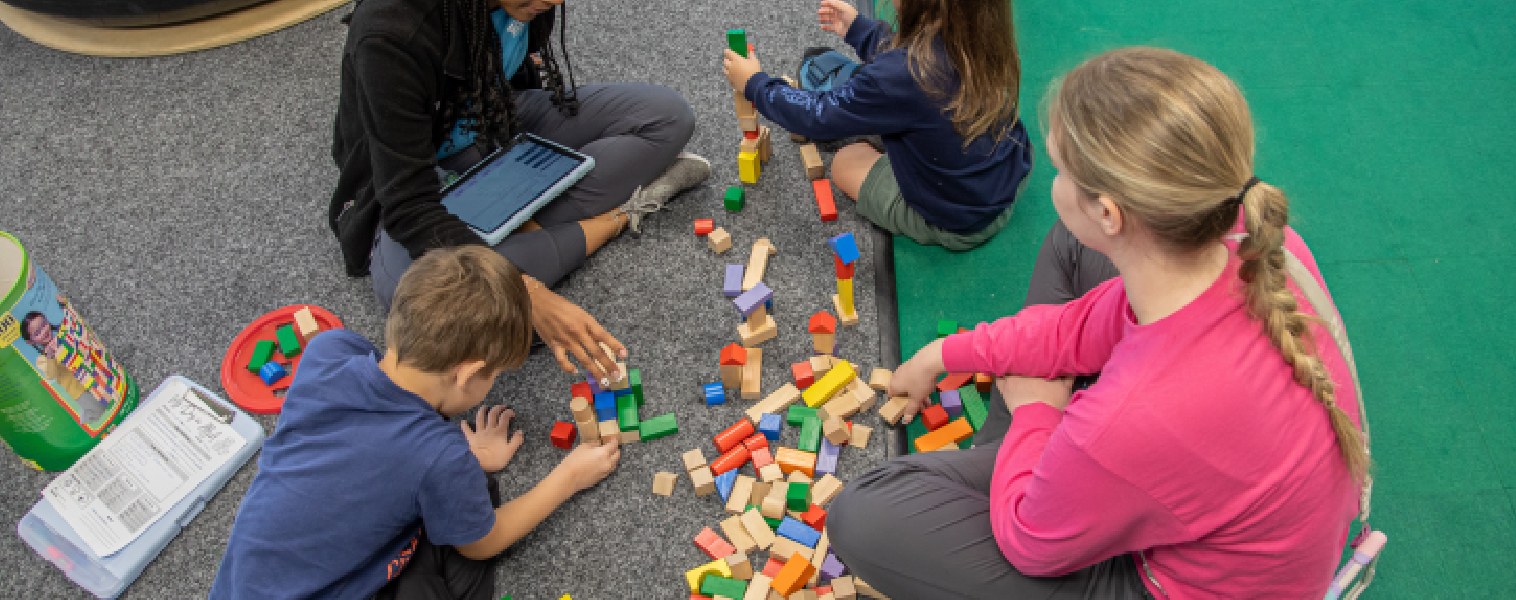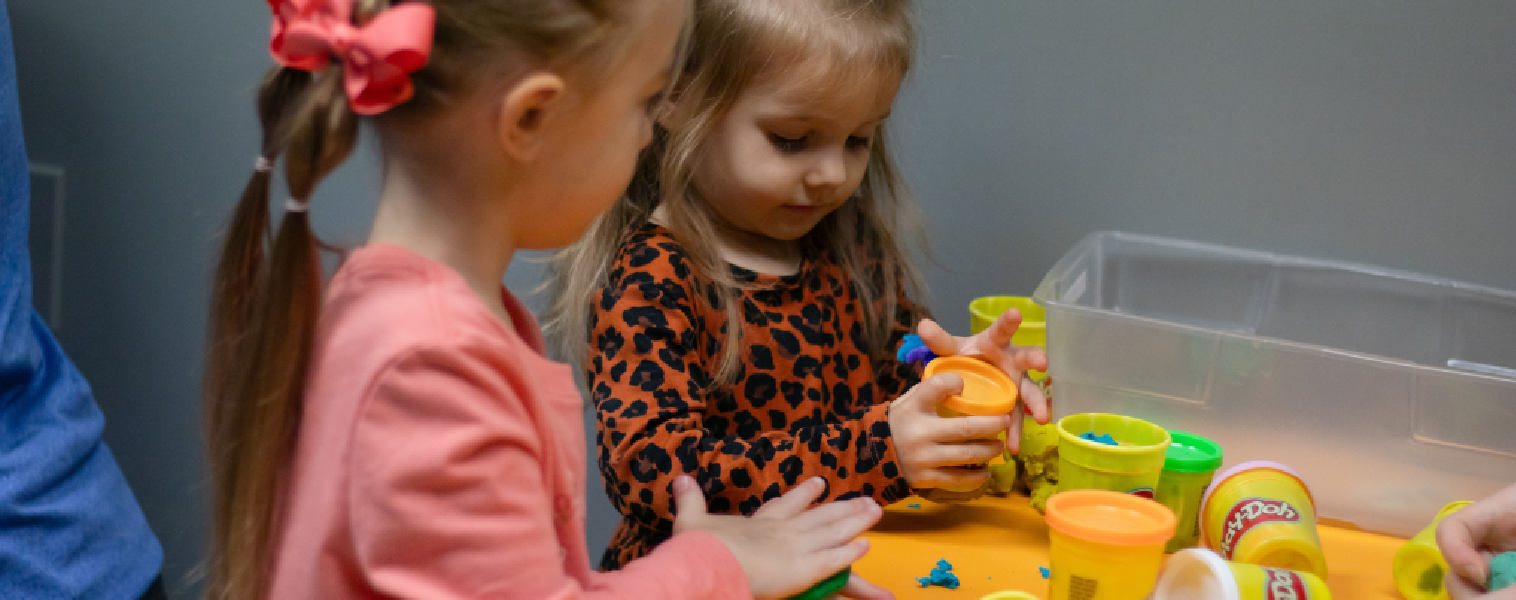We recommend calling us for a tour if you’re interested in ABA services. We will walk you through our facility, and answer any questions you may have.
Applied Behavior Analysis Services
Applied Behavioral Analysis, or ABA, is an effective therapeutic approach that helps autistic children with developmental challenges grow through positive reinforcement. Our Board-Certified Behavioral Analysts (BCBA) lead whole-child assessments in order to create customized goals and craft individualized programs for each child. Then, our Registered Behavior Technicians (RBT) provide 1:1 support, helping your child practice and master vital skills in a fun and engaging setting at Building Blocks!
What makes ABA at BBPT different?
At BBPT, our staff is knowledgeable that behavior often stems from difficulties in communication or in processing sensory stimuli. They are educated on how to dive into a “behavior” and figure out the why. Oftentimes, once we have a child’s sensory processing well regulated, we see the child flourish in all aspects of their life, including lessened behaviors.
Functional Communication Training
Functional communication training involves teaching children to communicate effectively through verbal and non-verbal interactions. This is especially used with children with autism spectrum disorders to help decrease problem behaviors that occur due to a child’s frustrations and previously learned ways to gain attention or get needs met by replacing them with more functional and meaningful ways of communicating. This may include learning the use of simple words, phrases or sentences depending on skill level. It may also include the use of such things as sign language, pictures (PECS), or electronic devices.

Behavior Management
ABA therapy incorporates behavior management strategies to teach children essential skills like patience, self-regulation, and decision-making. These strategies include practicing deep breathing and counting, making choices, and accepting alternative options. ABA also focuses on reducing undesirable behaviors and promoting positive behaviors, ultimately leading to greater independence and improved quality of life.

Parent/Caregiver Training
Parents are the primary teachers in their child’s life. Partnering with a child’s parents/caregivers is a vital part of the effectiveness of Applied Behavioral Analysis. Parent/Caregiver meetings are routinely scheduled at Building Blocks to give updates and share information on what goals are being currently worked on. Shared information on what is working at home and what is working in the clinic is helpful in planning lessons as well as shaping behaviors. Consistency between home and clinic is crucial to ensure the greatest outcome from a child’s ABA services.
Group Skills & Classroom Readiness
Group skills are learned through Circle Time with peers at Building Blocks Pediatric Therapy Center. Circle time includes activities such as calendar, number and shape of the day, story time, gross motor games, music, and movement. A group leader is in front of the group while the therapists sit behind each child to prompt responses to the group leader as necessary. As the skill level increases, so does the level of group activity. Circle Time is designed to work on listening and participation skills necessary for school readiness.

Positive Reinforcement
Positive reinforcement is key to a child’s success! Whether it’s a simple word of praise or a special reward, positive feedback motivates children to work hard and achieve their goals. By recognizing their efforts and celebrating their accomplishments, we can foster a growth mindset and encourage self-confidence. This approach not only helps children learn new skills but also empowers them to become more independent and resilient.
Evidence-Based Interventions
The interventions used here at Building Blocks Pediatric Therapy are backed by scientific research. Our Board-Certified Behavioral Analysts (BCBA) are fully educated and trained in the practice of Applied Behavioral Analysis. They have obtained their master’s degrees and remain up to date with ABA related research information. They rely on implementing methods that have been proven to be effective in helping children with autism spectrum disorders reach their fullest potential.

Self-Help Skills
Self help skills are a crucial part of the Applied Behavioral Analysis program here at Building Blocks Pediatric Therapy. Skills such as toileting, tooth brushing, food prep, folding laundry, and other self-help and life skills can be incorporated into a child’s program.
Gross Motor Skills
Gross motor skills incorporate the large muscle groups. These skills are worked on both during individual lessons and also as a part of group interactive play. Running, jumping, climbing, raising arms, and stomping feet are just a few examples of gross motor skills. Fine motor skills incorporate the small muscle groups. These skills are incorporated into writing and tracing activities, using the fingers for things like zipping jackets, putting pieces of a toy together or pointing to items. Fine motor imitation with fingers and hands are also incorporated for more practice with these muscles.
WE STRIVE TO SEE YOUR CHILD THRIVE
Why We’re Different at Building Blocks
At Building Blocks Pediatric Therapy, your child is more than their chart. Our therapists are as kind as they are qualified, utilizing research and play-based techniques designed to promote physical and cognitive development through active play with therapists, peers, and parents.












Social & Play Skills
Helping children with autism spectrum disorders learn to tolerate peers and adults, engage with them, and participate in group activities is an ongoing part of ABA therapy. Social skills including responding to their name, asking and responding to simple questions with a peer, and back and forth communication with peers. Parallel play, sharing materials, turn taking and game play are play skills that are incorporated into each child’s program here at Building Blocks Pediatric Therapy.